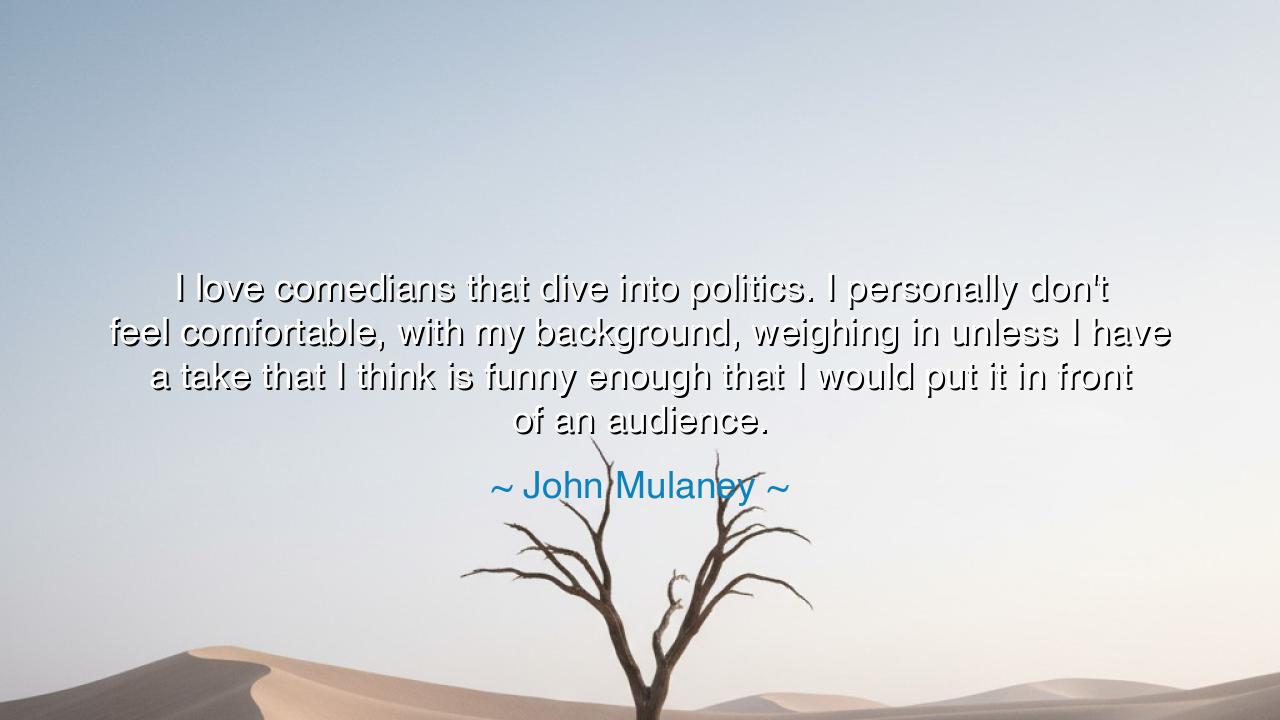
I love comedians that dive into politics. I personally don't feel
I love comedians that dive into politics. I personally don't feel comfortable, with my background, weighing in unless I have a take that I think is funny enough that I would put it in front of an audience.






When John Mulaney said, “I love comedians that dive into politics. I personally don't feel comfortable, with my background, weighing in unless I have a take that I think is funny enough that I would put it in front of an audience,” he was not merely speaking about comedy — he was speaking about integrity, wisdom, and the sacred responsibility of the voice. In these words, Mulaney revealed the mark of a thoughtful artist, one who understands that the power to speak publicly is not a license, but a trust. His humility is not hesitation — it is discernment, born from respect for both the audience and the truth. For in every age, there are those who speak loudly, and there are those who speak wisely. The wise know that not every thought deserves a stage.
The origin of this quote lies in Mulaney’s own journey through the world of stand-up — a craft where laughter is the bridge between truth and heart. Known for his sharp timing, elegant wit, and self-aware humor, Mulaney has often steered clear of direct political comedy, despite living in an era where such commentary is common. His restraint is not fear; it is principle. He admires those who can wield humor to expose the absurdities of power, yet he recognizes that to do so requires not only courage, but clarity — a vision that transforms anger into art. In saying he must have a take “funny enough” to share, he reminds us that humor, when used well, is not reaction but creation. It is the alchemy of thought and laughter that elevates mere opinion into something eternal.
To speak about politics, whether through comedy or rhetoric, has always been a dangerous art. The ancients knew this well. Aristophanes, the Greek playwright, used satire to mock the rulers of Athens and reveal the follies of war. His plays were filled with laughter, yet behind every jest burned the fire of truth. But Aristophanes was careful — he knew that mockery without insight was cruelty, and that rage without humor was chaos. His genius lay in his balance: he made the people laugh even as he made them think. John Mulaney, too, walks this same narrow path — one where the goal is not to shout from the mountaintop, but to speak when the words themselves have ripened with purpose.
In his quote, Mulaney also speaks to the virtue of self-awareness. He says he does not “feel comfortable, with my background, weighing in.” In this, he acknowledges something rare in the modern world — the understanding that one’s voice must be measured against one’s experience. The ancients would have called this sophrosyne, the virtue of moderation and self-knowledge. To know what one does not know is as noble as to know deeply what one does. It is the humility that guards against arrogance, the restraint that gives weight to words. When one speaks without reflection, their message may echo — but it will not endure.
Yet Mulaney’s admiration for those who “dive into politics” reveals not cynicism, but reverence. He celebrates those who dare to wrestle with power, those who use laughter as a mirror to expose deceit and absurdity. His caution is not judgment; it is the recognition that such work demands precision. To jest about politics without wisdom is to play with fire, but to do so with insight is to illuminate the world. The comedian, like the philosopher, must hold truth and levity in equal measure. One without the other collapses into noise.
There is a lesson here for all who live in times of division and noise: not every truth must be spoken in haste. Wait until your words are shaped enough to bring light, or laughter, or peace. Whether you are an artist, a thinker, or a simple observer of the world, let your speech be born of reflection, not reaction. Mulaney’s example teaches that silence, when chosen with intention, is not weakness — it is strength waiting for the right moment to emerge. And when that moment comes, when your “take” is true enough and funny enough, when it carries both heart and insight, then speak boldly. The audience will feel the difference.
So, my children, remember this: wisdom is not only knowing what to say, but when to say it. To speak with purpose is to honor both the truth and those who hear it. Do not rush to fill the silence; fill it only with meaning. For the words that endure are not the loudest, but the truest — not born of anger, but of understanding. Like John Mulaney, wait until your thought has ripened into something that makes both the mind awaken and the soul laugh. Then, and only then, will your voice ring clear — not as noise in the crowd, but as music in the heart of truth.






AAdministratorAdministrator
Welcome, honored guests. Please leave a comment, we will respond soon